Hitting The Wall
 A gray mist shrouded a sea of bobbing heads crawling past the Mile 23 sign. A sinewy ancient man wearing plaid Bermuda shorts, black nylon socks, and orange tennis shoes clumped along beside me. His iron-gray hair cinched in a ponytail, his leather face lined with a thousand creases, his every breath whistling like a tea kettle, he rasped in a singsong, sandpaper voice, “Run for the money, wheeze-wheeze, run for the gold, wheeze-wheeze, run till you’re o–o–o–old, wheeze-wheeze.” He flashed a taunting grin at me, picked up his pace, and disappeared into the crowd up ahead.
A gray mist shrouded a sea of bobbing heads crawling past the Mile 23 sign. A sinewy ancient man wearing plaid Bermuda shorts, black nylon socks, and orange tennis shoes clumped along beside me. His iron-gray hair cinched in a ponytail, his leather face lined with a thousand creases, his every breath whistling like a tea kettle, he rasped in a singsong, sandpaper voice, “Run for the money, wheeze-wheeze, run for the gold, wheeze-wheeze, run till you’re o–o–o–old, wheeze-wheeze.” He flashed a taunting grin at me, picked up his pace, and disappeared into the crowd up ahead.
By then, I felt no shame in losing a footrace to Zombie-Man. Whatever semblance of athletic pride I’d carried to the starting gate of the fifteenth Los Angeles Marathon flat-lined at Mile 21 when a sledgehammer of fatigue slammed me in the chest. From there on, I plodded forward in a crab-like, muscle-cramped gait, my legs filled with gelatinous sludge, my arms stone-heavy petrified fossils, each breath heaved through a pinhole in a plastic bag draped over my head and tied tightly around my neck. A vast herd of runners of all ages, shapes, and sizes passed me by – fat little kids, bone-thin octogenarians, a middle-aged squatty man with a rotund beer-belly, an old lady pushing a Dachshund in a baby stroller, a cowboy wearing a ten-gallon hat and snake-skin boots, twin Elvis impersonators running side by side. I didn’t care. After I hit THE WALL, excruciating pain crowded out all thoughts and feelings except for my desperate goal, a long-held dream, now a gasping nightmare, of teetering across a marathon’s finish line.
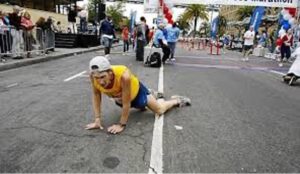 This death march went down on March 5, 2000. I was 52. Thirty years earlier, I’d taken up running in college to relieve stress and kept it up throughout my working life. I wasn’t fast, but I could run a long way at a slow pace. Somewhere along the line, the dream of completing a marathon got ahold of me, but my work schedule couldn’t accommodate the rigorous training required. Suddenly faced with an abundance of free time when I left Safeway in January, I signed up for the LA Marathon.
This death march went down on March 5, 2000. I was 52. Thirty years earlier, I’d taken up running in college to relieve stress and kept it up throughout my working life. I wasn’t fast, but I could run a long way at a slow pace. Somewhere along the line, the dream of completing a marathon got ahold of me, but my work schedule couldn’t accommodate the rigorous training required. Suddenly faced with an abundance of free time when I left Safeway in January, I signed up for the LA Marathon.
Being a slow runner, I set a snail-paced goal of finishing in 5 hours, an easy 11¾ minute per mile jog. Experienced marathoners recommend at least four months of training, five “short” runs on weekdays, beginning with 4 miles building up to 10, and one long run on the weekend, starting with 10 miles and ending with 20-plus. I’d been running a couple miles a day for years so I thought I could be ready in half the time. The eight weeks flew by, but I reached the 10-mile week-day standard and made it up to 18 miles on the weekend.
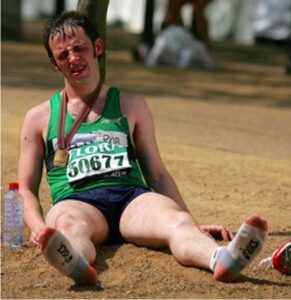 On March 5 at 7:30 am, 20,000 runners gathered in the starting pen on Figueroa Street in a torrential downpour. I stood at the back of the pack, peering through the monsoon at Mayor Riordan, perched on an elevated platform at the starting line. Laughing maniacally, his helmet of thinning white hair sopping wet, he shouted into a bull horn, “Welcome to sunny California” and fired the starting gun.
On March 5 at 7:30 am, 20,000 runners gathered in the starting pen on Figueroa Street in a torrential downpour. I stood at the back of the pack, peering through the monsoon at Mayor Riordan, perched on an elevated platform at the starting line. Laughing maniacally, his helmet of thinning white hair sopping wet, he shouted into a bull horn, “Welcome to sunny California” and fired the starting gun.
I was so far back I couldn’t move for a while, and even when the runners ahead of me lurched forward, I could only slow-walk. About fifty yards past the starting point, I finally had enough space to break into a trot.
Following Runner’s World magazine’s advice for first-time marathoners, I settled into a slow pace for the first half-marathon. I thought the rain would make the going more difficult, but it turned out to be an advantage. The temperature leveled off at a comfortable 60 degrees; my lightweight parka kept me dry; and my Nike’s flicked the water away.
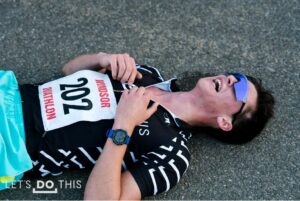 As we ran through downtown, people clad in rain gear lined the streets. “Keep going! You’re doing great!” Volunteers at the USC Coliseum handed us cups of water and shouted encouragement. Farther on, someone bugled a cavalry charge from a second-floor apartment window. At Mile 8, lightning struck, and thunder boomed. We all gasped, then cheered, and ran on.
As we ran through downtown, people clad in rain gear lined the streets. “Keep going! You’re doing great!” Volunteers at the USC Coliseum handed us cups of water and shouted encouragement. Farther on, someone bugled a cavalry charge from a second-floor apartment window. At Mile 8, lightning struck, and thunder boomed. We all gasped, then cheered, and ran on.
Cresting a little hill at Mile 11, we came upon the red-and-blue flashing lights of an ambulance. Paramedics surrounded a runner down on his back in the street. Single-mindedly focused on running the race, none of us stopped. We didn’t even slow down.
The rain lightened at the halfway mark. In the cool mist, I kicked into overdrive. On a runner’s high, I ran seven-minute miles through Hancock Park, pumped uphill to Hollywood, and sped back down toward the heart of the city, cruising through Miles 17, 18, and 19.
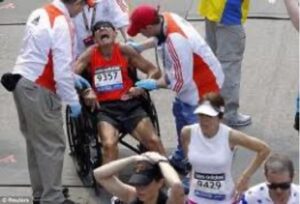 Then the terrain leveled off. I started to feel strange. Hollowed out. Numb. In the mid-Wilshire District, the course took a sharp turn, but my rubbery legs kept going straight. To force my strides to make a wide arc to the left, I had to lean sideways at a thirty-degree angle like a guy on a motorcycle.
Then the terrain leveled off. I started to feel strange. Hollowed out. Numb. In the mid-Wilshire District, the course took a sharp turn, but my rubbery legs kept going straight. To force my strides to make a wide arc to the left, I had to lean sideways at a thirty-degree angle like a guy on a motorcycle.
To the naked eye, the grade moving along Wilshire Boulevard toward downtown looks flat. It is not. There is a one-degree lift. I know this because running 21 miles gives you a whole new definition of steep. Running over that slight, almost imperceptible incline felt like scaling Mount Everest without an oxygen tank.
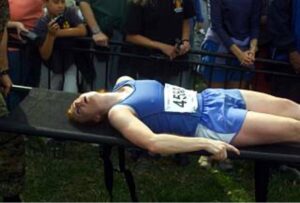 All the people I had passed in my speed-run since the halfway mark, plus thousands more, overtook me, including Zombie-Man. I couldn’t keep up with any of them. Each torturous step required a supreme act of will. I slowed to a walk, then stopped and leaned over, propping my hands on my knees. I thought I was done.
All the people I had passed in my speed-run since the halfway mark, plus thousands more, overtook me, including Zombie-Man. I couldn’t keep up with any of them. Each torturous step required a supreme act of will. I slowed to a walk, then stopped and leaned over, propping my hands on my knees. I thought I was done.
A woman on the sidelines shouted to me. “Don’t give up!” Others chimed in. “Keep going! You can do it! Dig deep!” A runner going past me patted me on the back, “Come on, buddy. We’re almost there.”
A short stout lady trotted by me. I gazed at black letters on the back of her yellow t–shirt. “IT’S NOT THE DISTANCE. IT’S YOU.” My blurry brain struggled to assimilate the message.
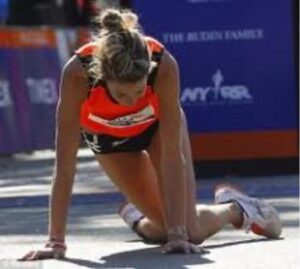 Riveting my eyes to those words, I leaned forward and fell into a painful, staggering jog. Through Miles 24, 25, and 26, when the t–shirt’s letters grew smaller, I’d reach way down and somehow find the strength to reel them in. They’d fade again, and I’d bring them back. Again and again, they pulled me forward.
Riveting my eyes to those words, I leaned forward and fell into a painful, staggering jog. Through Miles 24, 25, and 26, when the t–shirt’s letters grew smaller, I’d reach way down and somehow find the strength to reel them in. They’d fade again, and I’d bring them back. Again and again, they pulled me forward.
The last 385 yards. Downhill. Thank you, Jesus.
At the intersection of Figueroa and Wilshire, a team of men from Little Tokyo wearing white and red headbands pounded big drums, an upbeat boom, boom, boom. A race official with binoculars perched on a catwalk identified runners by the numbers pinned to our jerseys and called out names. “Ken Oder, San Marino,” boomed over the loudspeaker.
I made a left turn, motorcycle style, onto Flower Street. Thirty steps to go.
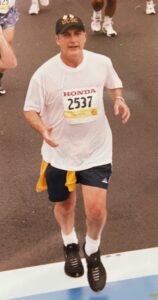 A digital timer hung over the finish line. Big red numbers, 4:59:53 and ticking.
A digital timer hung over the finish line. Big red numbers, 4:59:53 and ticking.
I tried to sprint. I could not.
I stumbled across the line at 5:00:05.
A race proctor draped a foil blanket over my shoulders. He clipped from my shoelace the microchip they had sent us to record our times at the starting line, various checkpoints, and the finish line. Then he guided me to a grassy bank where I collapsed. Lying there cramped up, depressed that I’d missed my goal by five seconds, and exhausted beyond all imagination, I vowed never to run another marathon.
A few days later a package from the race officials came in the mail. My computer chip deducted the time it took me to reach the starting line. My official time was 4:56:06. I’d beaten my goal. No matter that 6,990 runners finished ahead of me, I was elated.
In two weeks, the soreness eased off. I started running again, a couple miles a day. In June, I upped it to 5, then 8 in August. In September I ran 15 miles on a weekend day.
I felt good. Real good.
Maybe I wouldn’t hit the wall with a full training regimen. Maybe I could break 4 hours.
On March 4, 2001, a cool day with a light mist, I ran LA XVI. I hit the wall, but not as hard. My time was 4:25:29, a 30-minute improvement. I figured if I could lop 30 minutes off my time each year, I’d break the world record when I turned 62, so I signed up for LA XVII.
I didn’t break the world record. I couldn’t even break 4 hours, but I kept trying. After all, it’s not the distance. It’s you.



February 8, 2023 @ 8:54 am
Great description of your efforts!! After the birth of our second child, a friend and I started jogging on a regular basis. We enjoyed talking and spending mornings together. We built up to about 4 to 5 miles. At the time we lived in southside Virginia and there was going to be a 10 K race from Hampden Sydney College to Longwood College. My friend and I decided to accept the challenge! ( I remember that I probably walked more than I ran.) By the time we rolled in to the end of the “race”, my left foot REALLY hurt. I took off my shoe and ended up not being able to put it back on because it was very swollen! After a diagnosis of a metatarsal stress fracture, I decided that my “running” days were over!! Now I just walk on a regular basis along with a half- mile swim about 3 times a week. Congratulations on your Marathon efforts! I am very impressed!!
February 9, 2023 @ 8:27 am
Thanks, Betty Lou. Running was fun, like it was for you and your friend, until I became obsessed with it. If you can keep it under control and run casually, you’re okay. I didn’t and injuries became a problem. Both an osteopath and a cardiologist told me to stop running and take up walking. I didn’t listen and had to replace both knees. Still have a minor back problem, too. I walk now, like you, and horseback ride, both easier on the joints. Five miles a day qualifies you as a serious runner, though. Congrats on running a 10k, even if it caused you a stress fracture. It’s a great experience for the memory bank.
February 6, 2023 @ 3:05 pm
I love this one so much Ken. A lot of parallels to my own athletic accomplishment, you just describe it so much better than I could. I loved it. And loved that you hit your goal time on the first try
February 6, 2023 @ 5:12 pm
Thanks, Eric. I set a slackard’s goal, ha ha. I seem to recall you competed in triathlons. I’d never make it!
February 5, 2023 @ 2:19 pm
A friend of mine and I used to run about 5 or 6 miles a pop back when I was in my mid 30’s. He started training for a marathon and I didn’t have the time or incentive to try that. So I told him he was out of my league and I got to the point where I would run about 10 miles or so once in a while. I soon learned that running a lot was wearing out my knees and ankles, and eventually regressed down to walking with an occasional quarter to half-mile run. These days at age 75 I usually walk 2 to 4 miles a pop (3 to 4 days a week) and do moderate to light weight lifting to keep nimble and flexible. As you say, you probably need to be built for a marathon in order to run them. I knew at a relatively “young” age that I was not.
February 5, 2023 @ 2:29 pm
You were smart. I was not. I ran my knees down to bone on bone and had to go through double knee replacement surgery. My new knees have been great, but I’d still have the original versions if I’d listened to my body and stopped running before I got flat tires.
February 5, 2023 @ 11:18 am
You are such a good writer, Ken! Love reading your life stories with a good lesson.
February 5, 2023 @ 2:22 pm
Thanks, Colleen!
February 4, 2023 @ 9:33 am
Quite a lesson for the rest of life, Ken. Another good one.
February 4, 2023 @ 3:10 pm
Thanks so much, Gay! The life lesson here is don’t run a marathon!
February 3, 2023 @ 9:00 pm
Love reading about your journey with the LA Marathon, Ken. My daughter and husband are in to running marathons. She ran the LA Marathon in 2019….and like you, was one of the slower ones. In December they ran an Ultra Marathon in Malibu (think it was 32 miles). So enjoy your stories.
February 4, 2023 @ 3:09 pm
Wow! 32 miles. I’d never make it! Tell them I admire their stamina. Thanks for your kind words, Barbara, and for following my blog!
February 3, 2023 @ 5:53 pm
I’m so impressed. I can’t fast walk a good mile.
February 3, 2023 @ 7:08 pm
Thanks, but it was a long time ago. I can’t fast walk a mile these days either. I climb on a horse. It’s more fun!
February 3, 2023 @ 3:17 pm
Another wonderful post! I was cheering for you the whole way!
February 3, 2023 @ 7:07 pm
Thanks, Lucian. And you got to hear the story first-hand before it hit the website!
February 3, 2023 @ 2:29 pm
Great story. I wouldn’t even try it. Congratulations for going the distance multiple times.
February 3, 2023 @ 7:05 pm
Thanks! It was a long time ago, and unfortunately, it’s a good way to ruin your knees. It’s better to ride horses!
February 3, 2023 @ 2:01 pm
Fabulous telling of your story, Ken. Love the saying, “It’s not the distance, it’s you.” Will try to steer clear of Zombie Man and keep it in mind when I lace up on 2/24 in Ventura. I’m hoping all is great with you.
p.s. congrats on the 4:25!!!!
February 3, 2023 @ 2:32 pm
Hey Jonathan! Great to hear from you. I understand you have now run 100 marathons. What a stupendous feat! I’ll never forget the day I tried to run 10 miles with you. You pulled a muscle in your leg, stopped to work out the injury, caught up with me and left me in the dust. You’re and amazing runner, as well as an amazing guy. Hope you make it to 200!
February 3, 2023 @ 10:16 am
Dang, Ken… no wonder your knees gave out. How many marathons did you wind up running? I ran only one, and could relate to all the discomforts you mentioned. One was enough!
February 3, 2023 @ 1:21 pm
Hey Eric, One is enough! I only ended up running three. Although I trained for several more, nagging injuries kept me out, and yes I ran my knees into the ground. Pretty dumb. I have a friend from Safeway who’s coming up on his 100th marathon. I guess you have to be built for it.